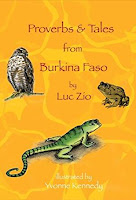Proverbs and Tales from Burkina Faso
by Luc Zio
Oh, Burkina Faso ... there just isn't much literature to work with. I checked out so many lists and did so many Google searches, to little avail. One list included a novel called Henderson's Spear, which I bought and started to read, but quickly realized that it was set in Tahiti and in England. I'm not entirely sure why it was on a Burkina Faso list or whether there actually a Burkinabe component. I did not finish the book. Then I found one called Exchange is Not Robbery: More Stories of an African Bar Girl, which looked really intriguing but ... get this ... would cost more than $30 to purchase, even on the Kindle version. Give me a break. I moved on. Or at least tried to. I considered The Parachute Drop, which seems to have been popular among other literary circumnavigators, but thought maybe I'd try something different in order to put a little variety out there into the blog world.
Enter Proverbs and Tales from Burkina Faso, by Luc Zio. By this point, I had realized that I inadvertently skipped over Bulgaria, a country for which I have already selected a book ... that is enticingly waiting for me on my shelf! But I'd spent so much time on Burkina Faso, I decided to press on and worry later about my apparent problem with alphabetical order.
I thought this slim little volume would give me a glimpse of Burkinabe life. The introduction was satisfying in that regard in that it discusses the importance of recording these bits of wisdom that primarily reside in the minds of village elders. It goes on to discuss how in the rural parts of Burkina Faso, children grow up hearing these stories and develop, as they grow and mature, an innate sense of what these proverbs mean and when or where to use them. There is a lovely, sort of stereotypical description of Burkinabe families, with people of all ages, gathered around an outdoor fire, sharing these stories as a way to preserve their culture and explain their lives. The author laments that, by contrast, the children growing up in cities do not have access to these experiences and that this lack makes them less mature. Interesting perspective.
I thought this slim little volume would give me a glimpse of Burkinabe life. The introduction was satisfying in that regard in that it discusses the importance of recording these bits of wisdom that primarily reside in the minds of village elders. It goes on to discuss how in the rural parts of Burkina Faso, children grow up hearing these stories and develop, as they grow and mature, an innate sense of what these proverbs mean and when or where to use them. There is a lovely, sort of stereotypical description of Burkinabe families, with people of all ages, gathered around an outdoor fire, sharing these stories as a way to preserve their culture and explain their lives. The author laments that, by contrast, the children growing up in cities do not have access to these experiences and that this lack makes them less mature. Interesting perspective.
Following the introduction, there is a little collection of proverbs that features the proverb itself, followed by an explanation of what it means. Most of them make good sense and aren't especially difficult to understand. Here is my favorite:
Life is like a chicken butt; sometimes it drops eggs and
sometimes it makes some droppings.
What does it mean? It means that life has ups and downs;
sometimes things are good and sometimes they aren't so good.
You gotta admit, that's pretty darn funny! Another favorite, more serious this time:
A woman's mouth is her quiver.
What does it mean? In Burkina Faso, it is believed that while
men fight with fists, guns, and knives, women use their mouths
as a weapon to fight back and defend themselves. Sometimes
words can be more powerful than actions.
The last section of the book are the tales ... little stories featuring animals explain some aspect of the world, much like myths did for the Greeks and the Romans. The story of The Hyena and the Goat, for example, explains why goats don't have tails ... it's because a naughty little goat once disobeyed his parents and went for a walk in the woods alone, only to be chased home by a hyena that bit off his tail just as the little goat reached the safety of home. Then there's the story of The Blind Old Man ... which tells how a blind man's youngest child helped him to regain his sight by bribing a sparrow-hawk though the offering of a chicken. At the end of the story, we learn that this is why sparrow-hawks like to hunt chicken and, most importantly, why the youngest child is always the most loved in the family.
In the end, this was an amusing little foray into Burkina Faso's old culture. I usually love books set in Africa so am sorry to have missed a chance to have a more modern glimpse of real life in this tiny West African country ... but I'm equally glad to have expanded my horizons by spending a little time with this unusual genre.

